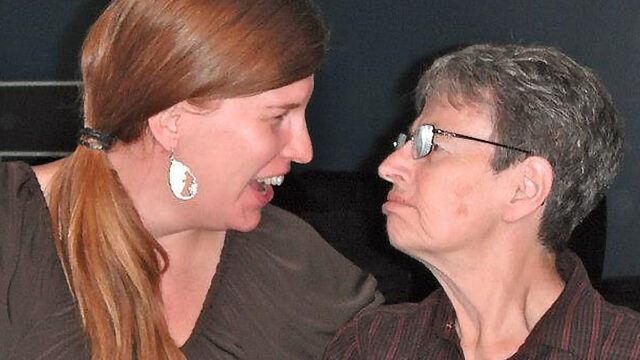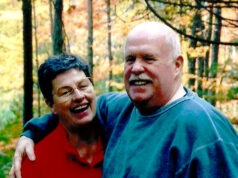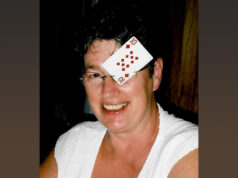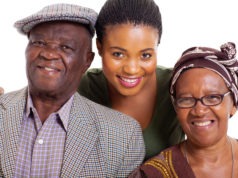Suzanne: And welcome everyone to Answers for Elders Radio Network heard all across the U.S.A., and also on your favorite podcast channel. And we are here to talk about the hard stuff, and sometimes there’s hard things when you have a diagnosis that might mean your life is changing. Specifically about Parkinson’s disease, it’s much more noticeable, you’re dealing with tremors, you’re dealing with all types of inabilities with your brain to think things through, and all kinds of things. And so we are here, back again, with Lianna Marie, who is the published author of a million Parkinson’s books, but most recently, “The Parkinson’s Path,” and welcome back to the show, Lianna.
Lianna Marie: Thank you. And by the way, “The Parkinson’s Path” isn’t out yet, but soon, soon.
Suzanne: Soon! A year from now, somebody may be listening to this podcast, and it is out.
Lianna Marie: So it is out! So for y’all in the future, it is out.
Suzanne: There we go. But we’re really excited to have you on the show. And I can imagine, when you get a diagnosis, the first thing is, you probably are in a little bit of denial. But when people are asking you, there’s gotta be a sense of, with all the symptoms happening, and all those things, it’s embarrassment. I, I don’t know what other other word to talk about, but do you find that that happens?
Lianna Marie: Yeah, in general, there is a stigma, unfortunately, surrounding Parkinson’s for all different reasons. And everyone’s different with Parkinson’s, we always say that again over and over and over again. So what you look like versus the next person, and the next person, and the next person, if you’ve seen one person with Parkinson’s, you’ve only seen one type of Parkinson’s. So but all that to be said, there are some similarities. And where, for example, some might see someone who’s got a stooped posture, something that’s common with people with Parkinson’s, or they’ve got a tremor and walking a little wobbly, and the the assumption by someone is this person’s inebriated. They something think something like, “Oh my gosh, that person’s drunk”. Why are they walking down the street that way, that kind of thing or they, the way they are speaking slowly. People with Parkinson’s, their speech is quieter, or slower, and the assumption is that they have some kind of intellectual disability. So those are two common ones, the drunkenness and this person’s not quite got all the marbles, for example. Unfortunately, those are some common ones, and because of that, you can imagine somebody with Parkinson’s like my mom, she was very aware of her tremor, and sometimes when you’re a person with Parkinson’s, you think it’s bigger than it is, though, it was this tiny little tremor to start. But she thought it was like this massive, like big red beacon on her that said, look at me. And I get that, because she’s living with it, and it’s not something she’s very excited to show off, obviously.
So that can happen too, where a person with Parkinson’s thinks that whatever their challenge is being beaconed away to somebody. But on the other hand it’s still something that needs to be addressed. And so, with my mom, when she was a little embarrassed about that tremor, I guess a lot of times it would be out in public when we’d go out for dinner, for example. She didn’t like the attention when she’d walk into the restaurant. Again, not that everybody was staring, but in her mind, everybody was staring. Cramped spaces often would make her slow down or abruptly stop, which many people with Parkinson’s experience. And so when that would happen, instantly, she’s like, “Oh, my gosh, all eyes are on me.” I’m stopped in the middle of a restaurant and get very frantic, very embarrassed, that she’s not able to move, and that kind of thing. So those were some specific things that could happen, or would happen with her. It did take some time for her first of all to just accept it, relax about it, and go, “You know what, this is me, and whatever y’all think about me is what you’re thinking.”
And they may not even be thinking that, but we did address some things to try to kind of circumvent certain situations that would not attract attention. For example, those crowded situations, I often would say, ok, what’s the restaurant layout? Where are we going? Where are we gonna sit? And we didn’t go into the restaurant until I knew if she was worried about her wheels shutting down, her leg stopping or whatever, I’d say, “OK, well, you know what mom, we’re gonna get you a spot right at the front of the restaurant, so that there’s less attention, or we’ve asked for a booth to the side, or whatever it was, just to kind of get that, if we just plan that a little bit ahead, it didn’t have to be this big thing, Because again, I will say sometimes she got a little bit more anxious about something that wasn’t even occurring. But she, in her mind was thinking everybody’s looking at me. So those are some things that we did try to pay attention to, to get around. I guess not unlike a lot of people who have disabilities don’t want the attention. Like, hey, I’m in a wheelchair, so what?
Suzanne: So it’s a vulnerability, when you look at you’re feeling vulnerable and exposed. And in that situation there’s this feeling of uncertainty. It’s interesting — it’s not regarding Parkinson’s, but I just finished watching the Bridgerton prequel, about Queen Charlotte and King George the third, and his mental state, but he was embarrassed and he hid himself for the first part of their marriage. The thing that was interesting was, is there was this thing that they did together and it clicked on me with a caregiver, and they had a kind of a mantra that they’d say to each other. You and me, it’s like we’re a unit, we’re a team. And that’s the piece, when I look at when you’re taking care of someone, to say, I’ve got your back, I’m part of you. I’m with you. Wouldn’t you say that that’s part of it?
Lianna Marie: Absolutely, championing being my mom’s champion. You know, one of the things we found really helpful was, honestly, using humor. And my mom had to be very deliberate. Sometimes I said, mom you’re right, that person did talk down to you and you need to stand up for yourself. You need to say, “You know what? I’m owning my life here. I have Parkinson’s, but Parkinson’s doesn’t have me, and by the way, I’m still me.” But the humor aspect too is like, if it was a stranger — because you talk differently to a stranger than you do to your friend — and to a stranger you’re like, “I’m not dead yet.” If she fell over or leaned into something, and somebody’s overly reacts, it’s like, “I’m ok,” or however you want to approach it. But some people find just having that — it’s easier said than done, but taking yourself a little less seriously, because at the beginning there’s so much about you, and you’re so focused now on that tremor, my slurred speech, or whatever it is that is attracting people. But if we just kind of go, “you know what?” Easier said than done. Especially at the beginning, it takes time. I’m not saying that this is an easy task, but in general, the more we can take things a little less seriously, add a little humor and playfulness. And Michael J. Fox is great at making jokes about himself, like when he falls or, or something like that.
Suzanne: He talks about the elephant in the room. And no matter what kind of issue that somebody might have, people tend to talk around it, or they don’t bring it up or something like that. I think it’s great when number one, it can be there in the room with you, and everybody is there to support that person even though that thing is there in the room. And that’s the thing that I love about what you’re championing, because so often when we go visit a friend or a family member that may have a diagnosis, we don’t bring up the diagnosis. They may be having cancer or a terminal illness, or something like that, and you never know how to bring it up. Do you have any advice on that?
Lianna Marie: Well… because it is awkward, right? I try to talk to people with Parkinson’s and ask them, what is your preference? I mean, if they’ve told everybody about their diagnosis, it’s like, hey, it’s part of my life. Do they want to talk about it all day long? No, because they want to be known for who they are, not Parkinson’s. It’s just that there is this beginning phase of how do we navigate this together? You have this thing, and it’s helpful when a person with Parkinson’s does say, hey, I’m still the same person and yeah, look at my hand over here. Yeah, it’s got a mind of its own and it’s gonna move around while we’re talking. But yeah, you know what, I’m still me, let’s just still have this conversation. But if you need to ask me questions about what’s going on with my body, like it’s an individual thing because some people are very private and they’re like, I don’t want to talk to you about my medical diagnosis. But I feel like the person does have to set those boundaries with their friends, their family members, and says, I’m fine. Ask me questions, or you know what, I’d just rather we just talk about whatever else, anything but.
Suzanne: There’s days you’re gonna want to talk about it, and not. Getting back to what you’re saying, just have the conversation, but be open to where they are. Wouldn’t you say that that’s true? Some days it’s an important thing. Some days it’s not?
Lianna Marie: Let them lead the conversation when it comes to Parkinson’s. And and otherwise, just be there, and offer to say, “hey,” because a true friend does that, they don’t bail on you and just say, oh my gosh, you’ve got a disease, and now I’m out of here. Just be that friend still. Try not to make it all about Parkinson’s.
Suzanne: Exactly.
Lianna Marie: Which is my website. (laughs)
Suzanne: Well, that is true. Yes. And for those of you, you can always reach Lianna at her website, which is AllAboutParkinsons.com. And we also invite you to listen to more of Lianna Marie’s podcasts on your favorite podcast channel. And Lianna, we look forward to talking to you again soon.
Lianna Marie: Thank you.













